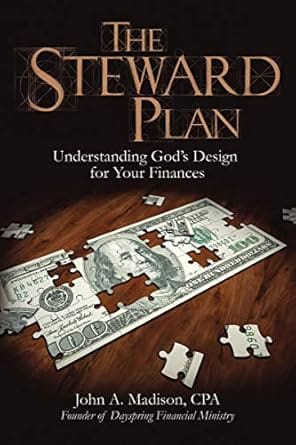
Core Beliefs for Christian Personal Finance
What are the core beliefs that should serve as a foundation to a Christian’s wealth goals and management? How should a believer view personal finance? And how do we execute those beliefs in practical, real-life steps?
First, believers should always remember that God owns everything, at all times. “Indeed, heaven and the highest heavens belong to the Lord your God, also the earth with all that is in it” (Deuteronomy 10:14 NKJV). Genesis 1:26 (NKJV) (among other verses) specifically states that mankind is to have dominion (or control) over “all the earth,” but it does not state that God cedes ownership to us. We are only temporary stewards of any wealth we may possess. Eventually, everything we own will either be owned by someone else (property, money in the bank or invested in stocks or bonds) or used in full and of no future value (food, clothing).
As stewards, Christians are to manage the resources we control in a manner that is pleasing to the true owner, God, and consistent with His principles. He expects us to be consistently trustworthy in our management of His wealth. 1 Corinthians 4:2 (NKJV) states, “Moreover it is required in stewards that one be found faithful.” That doesn’t mean, though, that we’re to live as paupers, never enjoying the resources He’s laid before us. In fact, it’s quite the opposite.

As any good father would, He wants us to enjoy our lives and the blessings He has given to us. That would include using a portion of our wealth not just for the bare minimum living standards, but also to enjoy the fruits of our labor. The key requirements, though, are to never lose sight of who the true owner is and to never look to our possessions for meaning and contentment. Our relationship with Christ is the most important and should always retain that vital position in our lives.
Second Timothy 3:16 (NKJV) states that “All Scripture is given by inspiration of God, and is profitable for doctrine, for reproof, for correction, for instruction in righteousness.” The instructions given in the Scripture cover many areas of our day-to-day spiritual and physical life. Thus, it comes as no surprise that the Bible is overflowing with verses concerning the use of money and the place it should (and should not) play in our lives. Every verse is included by God’s design and is important in its own right. However, to prevent this book from being thousands of pages long, the scriptural references have been culled to a more manageable list of verses. It’s important to note, though, that none of the excluded verses contradict the financial principles discussed throughout this book. It is from these verses that we find the stewardship steps He expects from us as the manager of His resources.
The STEWARD Plan for a Christian’s Personal Finances
In order to simplify the steps a steward should take in managing God’s wealth, we can follow the STEWARD Plan. By addressing each of the personal financial areas covered by the seven letters of the acronym, a steward can create a comprehensive and biblically compliant plan.
Care should be taken to address each of the seven areas listed below and detailed in subsequent chapters. While each is independent of the others, they work together to create a full, comprehensive financial plan.
The STEWARD Plan
Set financial goals (Chapter 2) — As the expression goes (commonly attributed to Benjamin Franklin), “Failing to plan is planning to fail.” What would God have you to achieve with your personal finances? Are you placing your goals above His goals for you?
For where your treasure is,
there your heart will be also.
Matthew 6:21
Tithe cheerfully (Chapter 3) — We give out of obedience and recognition that all we have is His anyway. But are we doing so cheerfully and willingly?
As soon as the commandment was circulated, the
children of Israel brought in abundance the firstfruits
of grains and wine, oil and honey, and of all the
produce of the field; and they brought in
abundantly the tithe of everything.
2 Chronicles 31:5 NKJV)
Establish a spending plan (Chapter 4) — Here, the steward lays out the spending plan each month to maximize the benefit of each available dollar toward meeting their financial goals. Money not given a specific purpose tends to disappear with no awareness of where it went.
Suppose one of you wants to build a tower.
Won’t you first sit down and estimate the cost to
see if you have enough money to complete it?
Luke 14:28
Wipe out consumer debt (Chapter 5) — Few things can hind long-term financial success and wealth building more than consumer debt.
Owe no one anything, except to love
each other, for the one who loves
another has fulfilled the law.
Romans 13:8 (ESV)
Accumulate diversified wealth over time (Chapter 6) — Building wealth usually takes time. Certainly, God’s Word cautions believers against pursuing quick gains at the expense of our walk with Him. So, what are some investing principles we should follow?
Invest in seven ventures, yes, in
eight; you do not know what disaster
may come upon the land.
Ecclesiastes 11:2
Remove unnecessary risk (Chapter 7) — Even the best, most biblically solid plans can be undermined and destroyed by retaining risk that should have been eliminated.
The prudent see danger and take ref-
uge, but the simple keep going and
pay the penalty.
Proverbs 27:12
Develop an estate plan (Chapter 8) — Scripture counsels believers to plan not only for our immediate needs, but also the needs of future generations. We should be generationally minded with our financial management.
A good person leaves an inheritance
for their children’s, but a
sinner’s wealth is stored up for the
righteous.
Proverbs 13:22
The balance of this book describes and explains each of these important areas of Christian personal financial stewardship, with one chapter for each topic. While it’s impossible to cover every possible scenario for these steps, the next chapters will, I hope, begin to help you understand the principle to be applied to your financial lives.
A Word of Encouragement as We Get Started
While we must constantly make important decisions about our finances, the most important of all is to adopt the mindset of a steward. Every financial decision we make should be viewed from that perspective. When I managed the business assets of my accounting clients, I never viewed them as my assets—I was a steward of their wealth and always made decisions that were in their best interest, not mine. Surely, all would agree that was the proper perspective and we all would desire that stewards of our assets behave in that manner. Likewise, God expects the same of us with the management of His wealth!
There is nothing magical about the steps recommended throughout this book. Most would be considered common sense. Further, there are no guarantees that your decisions will end up being right when viewed in hindsight, regardless of how closely you follow the guidelines contained in The Steward Plan. We’ve all made money mistakes in the past and will in the future too.
God doesn’t expect perfection in our stewardship any more than He expects us to be sinless after salvation. What He does want, in every aspect of our lives (including financial stewardship), is a heart that loves Him, places Him above all else, and sincerely commits to following Him. If we can do this, we need not worry about the financial decisions we have to make. Whether they turn out to be good or (in hindsight) not-so-good decisions, He knows our heart and our love for Him. That is, in my opinion, the very essence of being the “good and faithful servant” (Matthew 25:21) that He desires from each of us.
While I don’t know what will happen to me in my remaining time here on Earth, I know my eternity is secure. As a Christian, I have placed my faith in Jesus Christ alone and I accept the promises He has made to cleanse my sin and welcome me to Heave at the appointed time. Surely, if I trust God with my eternal soul, I can trust Him with my checkbook too.
…
Order your copy of The Steward Plan: Understanding God’s Design for Your Finances by John A. Madison
Trending Now
Sign up today for your Inspiration Today Daily Newsletter
Supercharge your faith and ignite your spirit. Find hope in God’s word. Receive your Inspiration Today newsletter now!
John A. Madison
John A. Madison is a CPA and Christian financial counselor with over 30 years of experience. He now pursues his calling to reach biblically based personal financial concepts through Dayspring Financial Ministry. Learn more at dayspringfm.com
Related Articles
January 29, 2026
5 Traits of Good Leadership
The traits of good leadership aren’t just about results—they’re about relationships. Servant…
December 9, 2025
End-of-Year Giving Benefits: Tax Savings, Legacy Gifts & Stewardship
As the year draws to a close, many believers take time to reflect on God’s goodness, their personal…
November 29, 2025
What Does the Bible Say About Finances?
Learn what the Bible teaches about money, giving, and contentment. Explore 10 scriptural principles…
November 20, 2025
Can You Smile at Your Future?
When you make the Lord your dwelling place amid life’s storms, you can rest confidently in His…
Next Steps To Strengthen Your Walk
Inspiration Today Newsletter
Supercharge your faith and ignite your spirit. Find hope in God’s word. Receive your Inspiration Today newsletter now!
Christian Articles
Find articles to strengthen your walk and grow your faith. We have a wide range of topics and authors for you.
Submit A Prayer Request
We are here for you. Simply click on the button below to reach us by form, email or phone. Together we will lift our hearts and voices with you in prayer.





